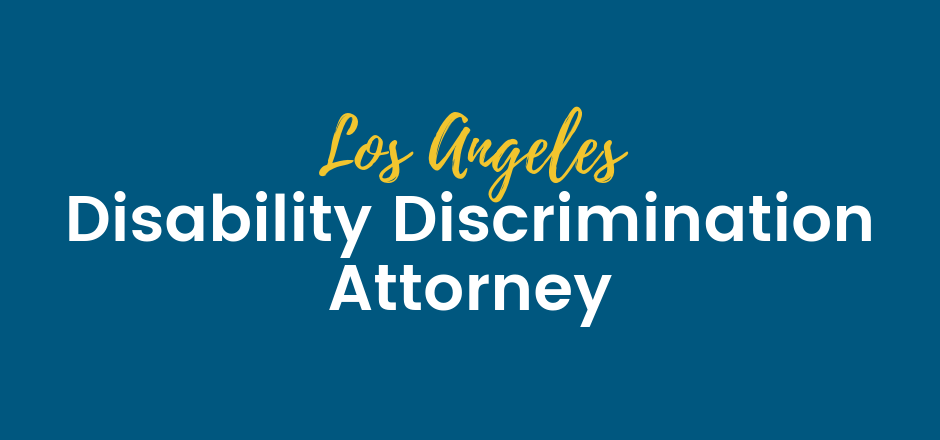Los Angeles Disability Discrimination Lawyer
A disability discrimination lawyer will aggressively advocate your employment rights in California as either an employee or employer.
In this article, you will learn more about disability discrimination as discover the easiest way to find a Los Angeles disability discrimination attorney near you.
Los Angeles Disability Discrimination Lawyer
California has strict discrimination laws in place to protect both employers and employees.
An experienced disability discrimination lawyer will help you navigate the legal landscape whether you’re addressing a claim against your company or filing one as an employee.
So, how do you find one?
The SFVBA Attorney Referral Service is certified by the State Bar of California and meets the American Bar Association standards for a lawyer referral. With a comprehensive membership of over 150 well-established attorneys in the San Fernando Valley area of Los Angeles, we can help connect you with the best Los Angeles disability discrimination attorney for your needs.
What is Disability Discrimination?
Disability discrimination occurs when an entity covered by the Americans with Disabilities Act (ADA) or the Rehabilitation Act, such as an employer, treats an individual covered by those acts unfavorably because she or he has a disability.
Discrimination can also occur when an entity covered by the applicable laws treats a job applicant or an employee less favorably because he or she has a history of a disability, or if he or she is believed to have a minor physical or mental impairment that is not expected to last six months or less.
A person may not be discriminated against for having a disability under the following situations:
- Hiring
- Firing or lay-offs
- Pay
- Job assignments
- Promotions
- Training
- Benefits
- Any other term or condition of employment
The prohibition against disability discrimination much applies to any aspect of employment. Furthermore, it is illegal to harass a job applicant or an employee because he or she has a disability, had a disability, or is believed to have a minor physical or mental disability that will not last more than 6 months.
Harassment encompasses the following actions:
- Offensive remarks about a person’s disability
- Frequent or severe teasing, off-hand comments, and other incidents that create a hostile or offensive work environment
- Incidents that result in an adverse employment decision, such as a disabled person being terminated or demoted
What Does the Law Require for Employers of Disabled Persons?
Under the applicable laws, an employer must provide reasonable accommodation to an employee or job applicant that has a disability. However, this is not required if providing reasonable accommodation would cause significant difficulty or expense for the employer, referred to as ‘undue hardship’.
Undue hardship does not mean that a reasonable accommodation would involve some cost. It means that the accommodation would be too difficult or too expensive to provide. An employer’s size, financial resources, and business needs would be looked at when determining undue hardship.
A reasonable accommodation is considered to be any change in a work environment that would help a person with a disability apply for a job, perform the duties of the job, or enjoy the benefits and privileges of the job. If more than one reasonable accommodation is available, the employer may choose which one to provide.
When it comes to the employment application and interview process, an employer may not do the following:
- Require an applicant to take a medical exam before extending a job offer
- Ask a job applicant to answer medical questions before extending a job offer
- Ask a job applicant if he or she has a disability, or if the disability is obvious, what the specifics of the disability are
After the employer has given a job offer, the employer may do the following, but only if all new employees in the same job are required to do so:
- Condition the offer on the job applicant answering certain medical questions;
- Condition the offer on passing a medical exam
If the applicant has accepted the job and begun work, the employer can do the following, but only if the employer needs medical documentation to support an employee’s request for an accommodation, or if the employer believes that the employee is not able to perform his or her job safely or successfully because of a medical condition:
- Ask medical questions
- Require a medical exam
When medical questions are asked or when a medical exam is given, the employer must keep all medical records and information confidential. The medical files must also be kept separate.
How Can an Attorney Help?
The laws applying to employment discrimination are complex, and oftentimes employers are difficult to deal with and may try to intimidate employees or job applicants bringing claims.
An employment law attorney experienced with disability discrimination claims will have the skill and knowledge to handle such a claim against any employer, whether large or small. Additionally, he or she will not be intimidated by an employer’s tactics, and he or she can be trusted to aggressively advocate for the rights of his or her client.
If you or a loved one have been discriminated against by an employer or potential employer, or you suspect you have been, consulting with a disability discrimination lawyer will help you gain peace of mind and help you to seek appropriate compensation.
For a referral to a properly vetted attorney, contact the Attorney Referral Service of the San Fernando Valley Bar Association (818) 340-4529.




